Theatre and Performance Collection volunteer, Suzy Quinn, shares her unique experience of cataloguing the June Whitfield Archive.
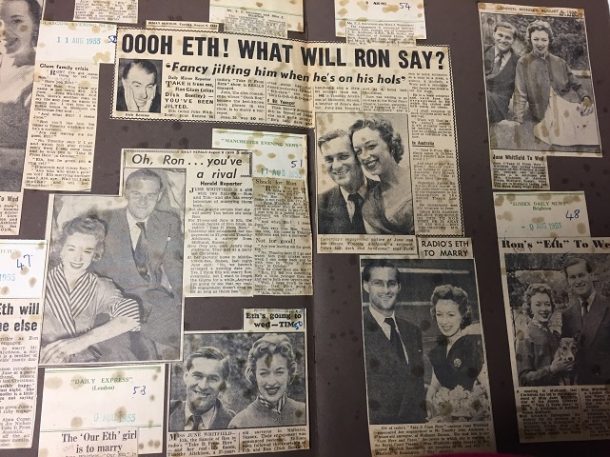
“That’s a lovely collection of engagement photos of Mum and Dad”, I thought as I went through one of the many scrapbooks belonging to my mother, the actress June Whitfield. These had been recently accessioned as part of her archive by the Department of Theatre and Performance department. For the last few months, I have been enjoying the experience of working in the Theatre and Performance Archive at Blythe House, cataloguing my mother’s archive. When Simon Sladen, Senior Curator in the department confirmed that my mother’s collection would be added to the V&A collection, I cheekily asked him if I could ‘shadow’ him to follow the journey of my mother’s ‘stuff’ as I am currently studying for an MA in Museum and Gallery Studies. To then find myself taken on as a volunteer and given the job of actually sorting through my mother’s documents to box and catalogue them, is a tremendous privilege, but also a unique experience for both the V&A and myself. There can’t be many daughters working on cataloguing their mother’s archive in a museum can there?
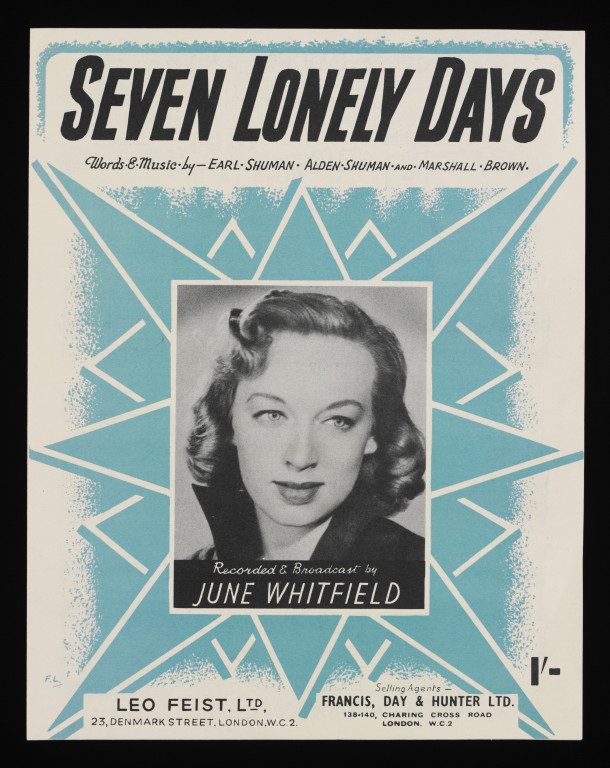
The plus points of being so close to the information I am sorting through are many. For example, I have direct access to the ‘primary source’ – namely my mother – should I need clarification over a document. Furthermore, I was there when much of the later information was collected. Therefore, the amount of research I have had to do on information in the archive post 1960 is minimal, as I remember it or at least have a memory of it. How lucky am I to be able to pick up the phone to my mother to confirm that memory? An instance of this occurred when I found a black & white photocopy of a headshot of Marion Davies, an early twentieth century musical comedy star. Attached to the headshot was a sample of red hair. I was intrigued. What was the significance of this document? I had discovered it amongst information about my mother’s appearance as Madame Dilly in the 2005 ENO production of ‘On the Town’. A memory of my mother in a red wig prompted me to call her and confer. As I suspected, the document was research for a wig style and hair colour for the character of Madame Dilly. Chatting with Sabrina Offord, Archivist and Conservation Manager for the Department of Theatre and Performance, I discovered that had I not been able to supply the knowledge about the headshot and hair, the significance of this document might well have been missed. So solving the mystery of the relevance to the archive of the headshot of Marion Davies was proof of how useful it can be to have a daughter working on her mother’s archive.
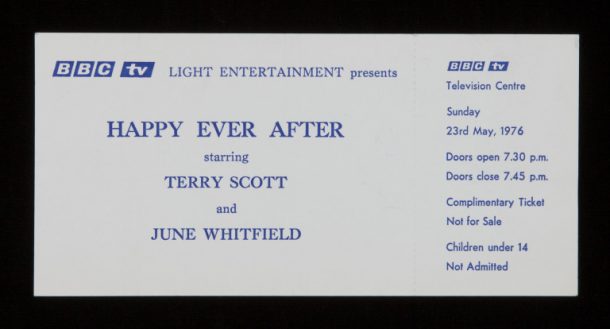
However, as I work I also have to remember that my input into my mother’s archive must be as objective as possible. With this in mind, I have resisted the temptation to re-organise some of her later filing that wasn’t quite as systematic as her earlier endeavours (no doubt due to the fact there were more demands on her time once she was married with a daughter – me!). One principle of archival practice is to maintain the original order of documents as much as possible, which I follow, even though I know if the later files were still at home my mother would be happy for me to re-organise them. Strange to think that before that morning when Simon came to collect the scrapbooks, scripts and correspondence that form the bulk of my mother’s collection, a cup of coffee could have been spilt on a script, or a page accidentally ripped and there would have been no dire consequences. But with the legal paperwork complete and the archive donated to the V&A, no coffee is allowed near these now precious documents being preserved for the nation, whilst every care is taken to keep the pages intact. Stranger still to me is the fact that in future, should I want to browse through any aspect of the June Whitfield Archive, I will have to make an appointment like any researcher to view the material in the Reading Room.
Another oddity for me and I’m sure for my colleagues as well, is that not only can I provide an ‘I was there’ context to much of the later information contained in the archive, but I am also part of the archive. In her scrapbooks my mother tended to mix the professional and the personal, hence the press clippings surrounding my parent’s engagement. Later scrapbook pages reveal assorted pictures of me at various ages, some with truly dreadful haircuts and outfits that I remember so well.
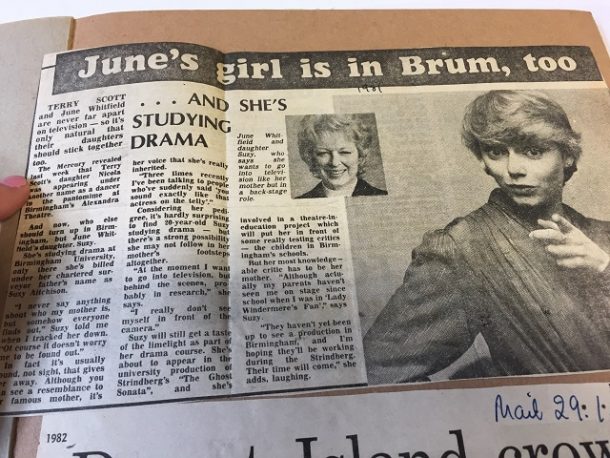
There are documents that resonate in the memory too, such as the programme for a Birthday Fair my mother opened at a local school in 1968, a school which I later attended. I remembered that my parents were looking for a suitable school for me at the time my mother opened the Fair, and The Study obviously filled their criteria. Seeing the programme and the accompanying correspondence, childhood memories flooded back, including the fact that my mother had opened the Fair, which I had completely forgotten.
I discovered another school connection when I was trawling through some notes my mother had made on a radio series in which she was taking part. I found a reference to a school quiz that had to be completed by Study pupils every Easter holiday. ‘Fair Deal’ a radio panel game, was centred around general knowledge of various topics. My mother obviously saw an opportunity to glean some useful answers for the quiz and I remember returning to school with answers that no one else had found, thanks to the brilliance of Ian Masters who devised ‘Fair Deal’ and who was extremely knowledgeable of even the most obscure facts. I think most parents ‘helped’ their children with the Easter quiz, answers being obtained by fair means or foul!
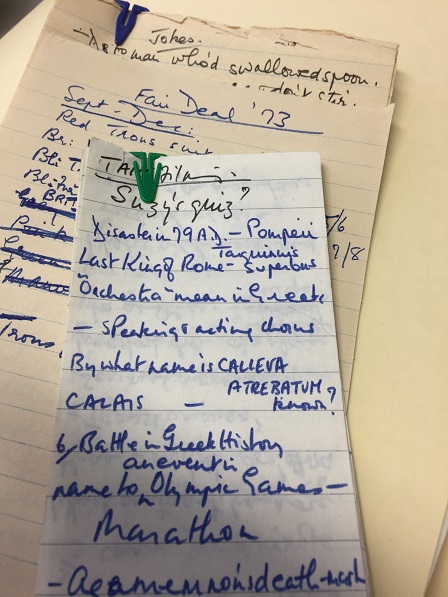
As I continue to examine my mother’s documents, I am discovering information about her and my family of which I was unaware or had forgotten. It is thanks to all the kind folk at the V&A, in accepting me as part of their volunteering team, that I am making these discoveries, which are emerging as a by-product of the cataloguing process. To have been given the opportunity to explore and sort these documents with the purpose of them becoming part of the Theatre and Performance archive, is an amazing experience in itself and one for which I am extremely grateful. Add to that the fact the documents are part of my family history, and I consider myself to be one very lucky actress’s daughter.
Dame June Whitfield will be appearing in conversation at the V&A Museum on Monday 22nd January.
In February 2018, Stand Up at the V&A will celebrate the centenary of women’s suffrage. The full line up and tickets are available on the V&A website.
More information about the June Whitfield Archive can be found on Search the Archives.
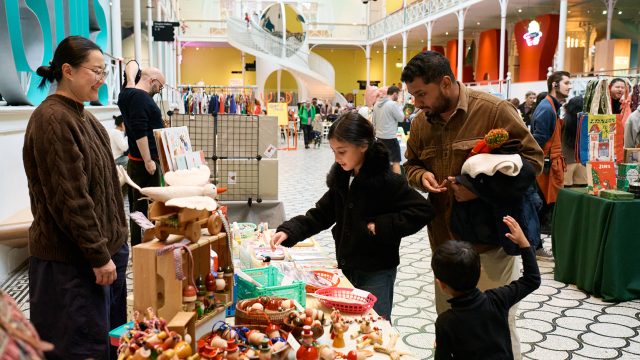
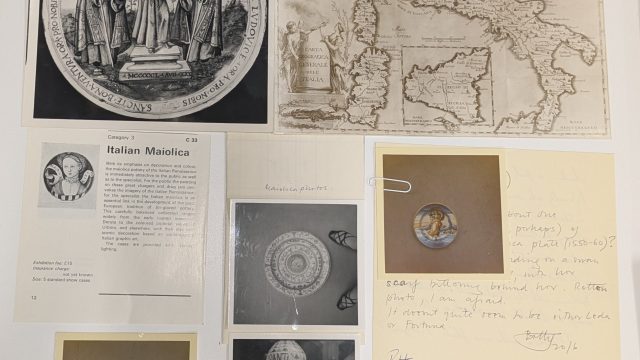
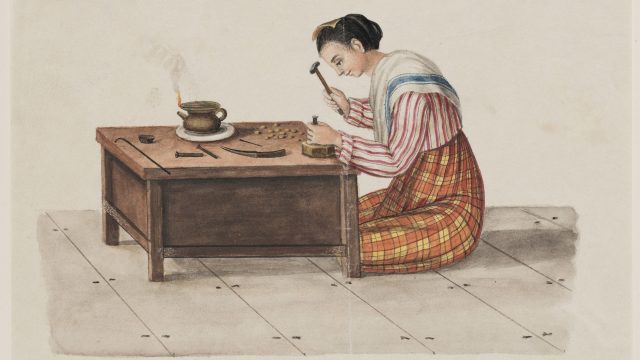
Thank you
Thanks to its simple yet effective gameplay, redactle is well-received by review sites as a puzzle game that both novices and puzzle veterans can enjoy.